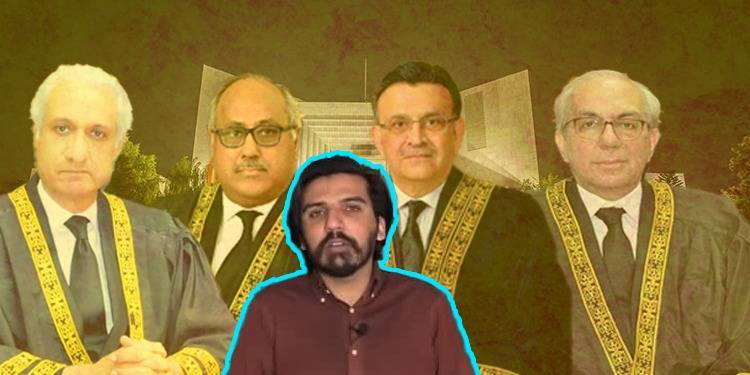
The dissenting note by Justice Shahid Waheed in the Qazi Faez Isa case was actually penned by no less than four judges, including judge Waheed himself, journalist Hassan Ayub revealed on Friday.
While speaking to journalist Asad Ali Toor, Ayub quoted his sources as saying that Justice Waheed was part of the meeting that jointly came up with the note, and so it was not an independent view of the judge.
Both Toor and Ayub also quoted CJP Bandial as heavily praising the dissenting note by Justice Waheed during the subsequent hearing.
Ayub confirmed that the other judges who were part of the meeting, included Bandial himself, Justice Muneeb Akhtar, and Ijaz-ul-Ahsan.
He added that Justice Jamal Khan Mandokhail wasn't a part of the meeting, which is being viewed as a part of an effort to counter the earlier judgement.
Read this too: Apex Court Rebuffs Justice Isa’s Decision; Circular Issued
Earlier today, CJP Bandial disregarded the order issued by Justice Qazi Faez Isa and Justice Aminuddin Khan with regard to his suo motu powers and said it violates the rules put forth by a five-member larger bench.
The top judge made the remarks as he turned down the Attorney General of Pakistan’s plea to form a full court to hear the PTI plea against the ECP order of postponing Punjab elections to Oct 8.
On Wednesday, the three-member bench – comprising Justice Qazi Faez Isa, Justice Amin-ud-Din and Justice Waheed ruled that hearing of all cases under Article 184(3), which is related to the CJP’s suo motu powers, be postponed till amendments in the SC rules. Justice Waheed had dissented from the decision.
“The interest of citizens therefore will be best served to postpone the hearing of this case, and of all other cases under article 184(3) of the Constitution, till the matters noted hereinabove are first attended to by making requisite rules in terms of article 191 of the Constitution,” the order read.
According to the order, the Supreme Court rules neither permit nor envisage special benches, however, a special bench comprising three judges was constituted to hear this case.
While speaking to journalist Asad Ali Toor, Ayub quoted his sources as saying that Justice Waheed was part of the meeting that jointly came up with the note, and so it was not an independent view of the judge.
Both Toor and Ayub also quoted CJP Bandial as heavily praising the dissenting note by Justice Waheed during the subsequent hearing.
Ayub confirmed that the other judges who were part of the meeting, included Bandial himself, Justice Muneeb Akhtar, and Ijaz-ul-Ahsan.
He added that Justice Jamal Khan Mandokhail wasn't a part of the meeting, which is being viewed as a part of an effort to counter the earlier judgement.
Read this too: Apex Court Rebuffs Justice Isa’s Decision; Circular Issued
Earlier today, CJP Bandial disregarded the order issued by Justice Qazi Faez Isa and Justice Aminuddin Khan with regard to his suo motu powers and said it violates the rules put forth by a five-member larger bench.
The top judge made the remarks as he turned down the Attorney General of Pakistan’s plea to form a full court to hear the PTI plea against the ECP order of postponing Punjab elections to Oct 8.
On Wednesday, the three-member bench – comprising Justice Qazi Faez Isa, Justice Amin-ud-Din and Justice Waheed ruled that hearing of all cases under Article 184(3), which is related to the CJP’s suo motu powers, be postponed till amendments in the SC rules. Justice Waheed had dissented from the decision.
“The interest of citizens therefore will be best served to postpone the hearing of this case, and of all other cases under article 184(3) of the Constitution, till the matters noted hereinabove are first attended to by making requisite rules in terms of article 191 of the Constitution,” the order read.
According to the order, the Supreme Court rules neither permit nor envisage special benches, however, a special bench comprising three judges was constituted to hear this case.

